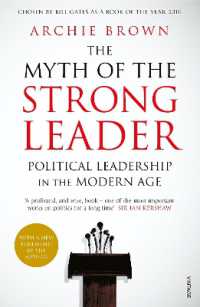Full Description
This book explores the unique experiences of Thai-speaking minority students within Malaysia's multilingual educational landscape. It focuses on how these students, often overlooked in educational discourse, navigate learning English as a third language amidst the linguistic dominance of Bahasa Malaysia in national schools.
It examines the sociolinguistic and educational challenges Thai-speaking students face in Malaysia, particularly in the context of English Language Learning (ELL). By focusing on this minority group, it highlights the broader dynamics of multilingual education and the implications of learning English alongside another non-native language, Bahasa Malaysia. By documenting the lived experiences of a minority group that is often marginalized in policy discussions, it offers new insights into how minority students navigate the dual challenge of mastering English as a third language and achieving academic success in a second language (Bahasa Malaysia).
This book adds to the body of research on linguistic minorities and educational equity, and challenges the existing paradigms of language learning in multicultural societies like Malaysia. It employs a qualitative research approach, with ethnographic observations and semi-structured interviews conducted among Thai-speaking pupils. These methods allow for an in-depth understanding of the students' cognitive and emotional responses to learning in a linguistically complex environment. It also introduces an innovative framework for assessing how sociocultural and linguistic factors intersect to affect learning outcomes.
Readers will gain a nuanced understanding of how multilingual and minority students experience education in Malaysia. This book serves as a helpful resource for educators, policymakers, and researchers interested in multilingual education, as it offers practical strategies to support minority students in overcoming linguistic barriers. Furthermore, it also offers a broader reflection on the importance of language diversity in achieving equitable educational outcomes.
Contents
Preface.- Chapter 1 Multilingual Realities and Minority Voices Education in Malaysias Diverse Classrooms.- Chapter 2 Theories in Context Understanding Language Learning Through Vygotsky Cummins and Translanguaging.- Chapter 3 Inside the Multilingual Classroom Investigating the Educational Experience of Thai Speaking Pupils.- Chapter 4 Learning Against the Grain Barriers and Coping Strategies in English Language Learning.- Chapter 5 Bridging the Gaps Pedagogical Insights and Policy Directions for Inclusive Language Education.





